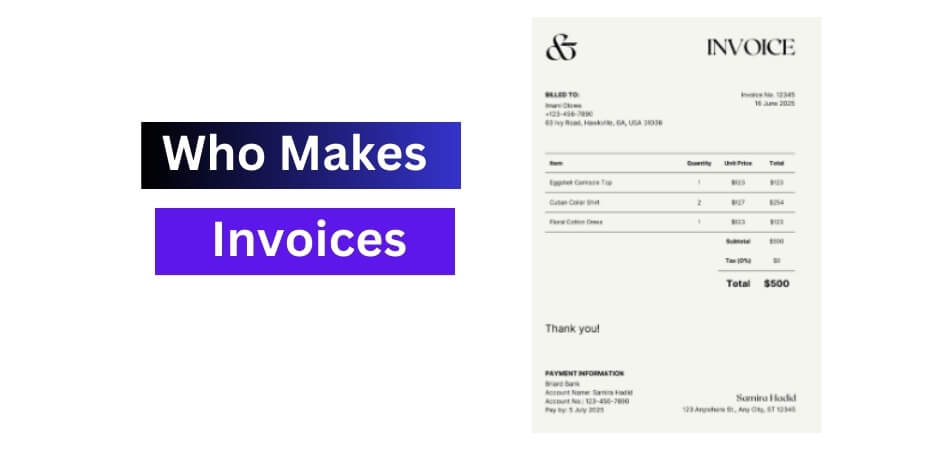Invoices are an important part of any business. They are the documents used to track and record payments, and they are essential for businesses to keep their finances in order. But who makes invoices? Who is responsible for creating these important documents? In this article, we will explore who makes invoices and the different processes involved in creating and managing them. We’ll also highlight why they are so important and the potential risks of not having them. Get ready to learn all you need to know about invoices and who makes them.
Invoices can be created by a business owner, a bookkeeper, or an accountant. Accounting software can also be used to make invoices. A great alternative is to use an online invoicing service like Invoice2go, Freshbooks, or Wave. This makes creating and sending invoices quick and easy.
Who Makes Invoices?
Invoices are documents that are used to record a transaction between two parties. Invoices are created by the seller, usually referred to as the invoice maker, to request payment from the buyer. Invoice makers are typically businesses that provide goods or services to other businesses or individuals.
Types of Invoice Makers
Invoice makers come in all shapes and sizes. Some of the most common types of invoice makers are:
- Retailers – Retailers make invoices for customers when they purchase goods or services from their store.
- Freelancers – Freelancers make invoices for clients when they complete a project for them.
- Contractors – Contractors make invoices for clients when they provide services or labor.
- Manufacturers – Manufacturers make invoices for customers when they purchase their goods.
- Distributors – Distributors make invoices for customers when they purchase goods or services from them.
- Wholesalers – Wholesalers make invoices for customers when they purchase goods or services from them.
- Service providers – Service providers make invoices for customers when they purchase their services.
How to Create an Invoice
The process of creating an invoice varies depending on the type of invoice maker. Generally, an invoice maker will need to include the following information on the invoice:
- Invoice number – This is a unique identifier for the invoice.
- Customer information – This includes the customer’s name, address, and contact information.
- Description of goods or services – This includes a detailed description of the goods or services that were provided.
- Total amount due – This is the total amount that the customer owes for the goods or services.
- Payment terms – This includes the payment terms and due date for payment.
- Invoice maker’s details – This includes the invoice maker’s name, address, and contact information.
Invoices can be created manually or using accounting software. For small businesses, invoices can be created using an invoice template. For larger businesses, invoices can be created using specialized invoice software.
Frequently Asked Questions
1. What is an Invoice?
An invoice is a document issued by a seller to a buyer, typically requesting payment for goods or services that have been provided. Invoices are typically sent after goods or services have been delivered and are due for payment. Invoices contain details such as the products or services provided, the price, taxes, shipping charges, or other fees that may apply. They also contain payment terms, such as when the payment is due, how the payment should be made, and any other terms or conditions.
2. Who Makes Invoices?
Invoices are typically created and issued by the seller. They can be created manually or using an invoice template or software. Depending on the type of business, invoices may be created and sent out by the seller’s accounting department, sales team, or other personnel.
3. What Information is Included in an Invoice?
An invoice typically includes information about the seller and the buyer, such as contact information and a unique invoice number. It also includes details about the goods or services provided, such as item descriptions, quantities, prices, taxes, and other fees. Payment terms and instructions may also be included.
4. Are Invoices Legally Binding?
Invoices are legally binding documents that represent an agreement between a seller and a buyer. They are used to establish a binding contract between the two parties, and they can be used as evidence in court if necessary. As such, it is important to ensure that all the details in an invoice are accurate and complete.
5. How Should an Invoice be Paid?
The payment terms and instructions included in the invoice should be followed. Typically, invoices are paid by check, bank transfer, or credit card. The payment method should be specified in the invoice.
6. What Happens if an Invoice is Not Paid?
If an invoice is not paid, the seller may take legal action to recover the unpaid amount. Depending on the payment terms, the seller may also be able to charge interest or late fees on the unpaid amount. The seller may also suspend the delivery of goods or services until the invoice is paid.
Invoices are an essential part of any business, and it’s important to know who makes them. Whether you’re a freelancer, small business owner, or large corporation, someone must be assigned to create and manage invoices to ensure that payments are accurately tracked and all financial obligations are met. Businesses may choose to use a professional accountant, a specific department, or even a software program to create invoices. Regardless of which option you choose, it’s important to ensure that the process is efficient, accurate, and secure. Having the right person or system in place to handle invoices can make all the difference in the success of your business.
